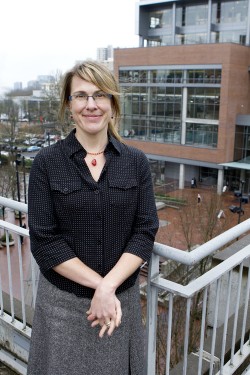Portland State professor of community health Stephanie Farquhar has received a $50,000 grant from the Northwest Health Foundation to be the principal investigator in a yearlong research study focused on homelessness and the process of addiction recovery. The study is part of a larger research project that has been a multi-year collaboration between PSU, Oregon Health and Science University and Portland community organization Central City Concern.
PSU professor receives $50,000 grant
Portland State professor of community health Stephanie Farquhar has received a $50,000 grant from the Northwest Health Foundation to be the principal investigator in a yearlong research study focused on homelessness and the process of addiction recovery. The study is part of a larger research project that has been a multi-year collaboration between PSU, Oregon Health and Science University and Portland community organization Central City Concern.

According to Farquhar, the study has a community-based participatory research model, meaning that the population being studied is involved in the design and execution of the research itself. The core team of about six researchers—which includes Farquhar, PSU sociology professor Matt Carlson, OHSU professor Robert Lowe and Director of Public Affairs for CCC Carole Romm—will develop interview questions for, and observe individuals who have been through, CCC’s programs.
“We are doing in-depth interviews with 15 to 20 consumers who have gone through at least one or two of the Central City Concern programs having to do with housing, employment and then medical or recovery services,” Farquhar said.
Central City Concern is a local organization with the goal to end homelessness by approaching the issue in a multifaceted way. Initially founded as a housing project in the 1970s, CCC has grown to include addiction recovery services and employment training, as well as physical and mental health care. As health care professionals began to realize the multiple social and medical issues tied to homelessness, CCC began to expand the types of services they offered.
Individuals who once utilized CCC programs often return to the organization as employees.
“When you look at the drivers of homelessness, it’s addiction and mental illness,” said Romm. “It’s not the economy so much. The homeless are generally folks who were marginalized anyway. We are trying to recreate the home that many of our clients never had.”
Lowe said that the research project will be a qualitative rather than quantitative study. “Rather than studying a lot of people in a very narrow way, we’re trying to get a much more in depth picture by spending substantial time with everyone we’re trying to get information from,” he said.
Consumers who have successfully completed CCC programs and have begun employment at the organization will actually become the study’s interviewers. Farquhar will train two CCC consumer-employees, and then they will be the ones to administer the research questions to those individuals chosen to be a part of the study.
Once completed, the interviews will be analyzed for common themes and trends. These thematic consistencies will eventually be developed into a data analysis summary to be shared with CCC, academic institutions and the Northwest Health Foundation.
The study has two main goals. First, this project works to fill a large gap in the existing research. “There isn’t a lot of research to show which type of [recovery programs] are working,” Lowe commented.
Second, the research team wants to gain a better understanding of why and how programs offered by CCC are successful, and then suggest ways in which CCC can improve its methods of care. “[The goal is] to inform Central City Concern about how to optimize their program,” Farquhar said. “We want to provide more data on success in order to empower the community partners and consumers so that they can advocate for more support at the state level for these effective programs.”
Back in 2010, the partnership forged between PSU, OHSU and CCC applied for and received a $400,000, three-year grant from the National Institute of Health through the National Institute on Drug Abuse. According to Romm, while the team was waiting to hear whether they had received the NIH grant, they also applied for the Northwest Health Foundation’s grant and have now received that grant as well.
The $50,000 from the Northwest Health Foundation will be specifically used to pay Farquhar, a PSU graduate assistant, the CCC consumers taking part in the research study and an interview transcriber.
Research is already under way. The two CCC research assistants will be chosen within the next few days.While homelessness is a social issue that has existed for most of human existence, Farquhar, Lowe and Romm all agreed that it is an especially pertinent issue to study because so little academic literature currently exists about its causes, perpetuators, and solutions.
“We are learning more about the social determinants of health,” Farquhar said. “We used to think it was the individual’s fault, that they were somehow flawed; that they were unable to cope, unable to sustain relationships, jobs and so forth. But now we’re recognizing that there are these other social and political factors at play that make people more vulnerable.”





